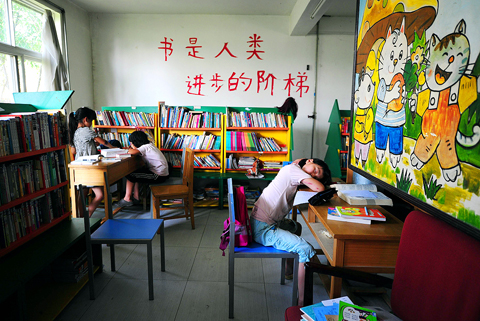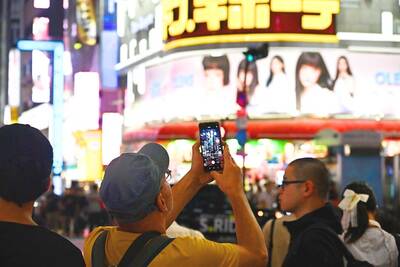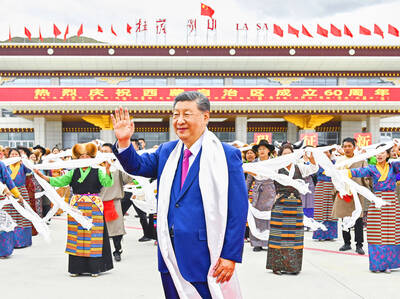Tu Ling likes to draw pictures for his father and dreams of being reunited with his mother. The 10-year-old is completely unaware that he will never live with either of them again. Tu’s father has been jailed for life for murdering his mother.
The boy is one of dozens of Chinese children living at Sun Village, an institution in the suburbs of Beijing set up by a former prison officer who says she wanted to give the offspring of inmates a chance for a fresh start.
“I realized what the prisoners were concerned about the most was not themselves, but their children and families,” Zhang Shuqin, the founder of Sun Village, said in an interview at the facility.

PHOTO: AFP
Zhang, 62, was inspired to start Sun Village after interviewing dozens of inmates for the prison administration bureau’s internal newspaper in northern Shaanxi Province.
Moved by their heartbreaking stories about being separated from their children and their distress at not knowing where they were, Zhang opened the first village in 1996 in Shaanxi.
Since then — and with no government funding — she has built another five villages, including the one in the Beijing area.
“Some kids were missing, some had been sold and others had been taken away by relatives. Some had no one to protect them when they were very young,” Zhang said.
Children as young as four months old are sent to Sun Village centers after their parents have been sentenced to serve time. Many have been abandoned by their relatives who are too old or poor to care for them.
Before arriving at the village, some children have been living on the streets for months, or even years, scavenging for food and resorting to crime to survive.
Ma Yufei, 12, said he has spent half his life at the village. Police brought him here from Hebei Province after his father was sent to prison. He says he doesn’t know where his mother is and is too traumatized to discuss his father’s crime.
“The children have various problems when they arrive — some hate the police for taking away their parents and others have a strong wish for revenge,” Zhang said. “Some have bad habits like stealing, telling lies or being violent because they have been living on the streets. We try to rectify these behaviors and give them counseling.”
The children live in brightly painted dormitories surrounded by vegetable gardens, orchards and playgrounds. Each dormitory has a live-in “mother” who cares for the children.
Zhang said the children attend local schools and then, if they pass the entrance exams, are sent to university or attend technical colleges to prepare them for adult life.
“It’s not enough to just feed and house the children. They must acquire skills so they can find a job in the future,” Zhang said.
With no help from the government, Zhang relies on donations from generous individuals and businesses to feed, clothe and educate the children.
“I like living here because there are lots of children, older brothers and sisters, aunts and uncles,” said Cao Xiangqian, 12.
Zhang said she has helped more than 2,000 children since starting Sun Village 14 years ago, but she knows it is only a drop in the ocean.
A government survey in 2005 found 600,000 children of prisoners needed help, she said. As China’s prison population grows, the situation is getting worse, so more Sun Villages are in the works, Zhang says.

Ten cheetah cubs held in captivity since birth and destined for international wildlife trade markets have been rescued in Somaliland, a breakaway region of Somalia. They were all in stable condition despite all of them having been undernourished and limping due to being tied in captivity for months, said Laurie Marker, founder of the Cheetah Conservation Fund, which is caring for the cubs. One eight-month-old cub was unable to walk after been tied up for six months, while a five-month-old was “very malnourished [a bag of bones], with sores all over her body and full of botfly maggots which are under the

BRUSHED OFF: An ambassador to Australia previously said that Beijing does not see a reason to apologize for its naval exercises and military maneuvers in international areas China set off alarm bells in New Zealand when it dispatched powerful warships on unprecedented missions in the South Pacific without explanation, military documents showed. Beijing has spent years expanding its reach in the southern Pacific Ocean, courting island nations with new hospitals, freshly paved roads and generous offers of climate aid. However, these diplomatic efforts have increasingly been accompanied by more overt displays of military power. Three Chinese warships sailed the Tasman Sea between Australia and New Zealand in February, the first time such a task group had been sighted in those waters. “We have never seen vessels with this capability

A Japanese city would urge all smartphone users to limit screen time to two hours a day outside work or school under a proposed ordinance that includes no penalties. The limit — which would be recommended for all residents in Toyoake City — would not be binding and there would be no penalties incurred for higher usage, the draft ordinance showed. The proposal aims “to prevent excessive use of devices causing physical and mental health issues... including sleep problems,” Mayor Masafumi Koki said yesterday. The draft urges elementary-school students to avoid smartphones after 9pm, and junior-high students and older are advised not

Chinese President Xi Jinping (習近平) attended a grand ceremony in Lhasa yesterday during a rare visit to Tibet, where he urged “ethnic unity and religious harmony” in a region where China is accused of human rights abuses. The vast high-altitude area on the country’s western edge, established as an autonomous region in 1965 — six years after the 14th Dalai Lama fled into exile — was once a hotbed for protest against Chinese Communist Party rule. Rights groups accuse Beijing’s leaders of suppressing Tibetan culture and imposing massive surveillance, although authorities claim their policies have fostered stability and rapid economic development in